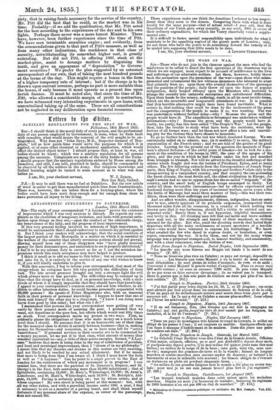trtt>'-r to tht elan.
SAN.ITAIty REGULATIONS FOR THE SEAT OF WAR. Folkestone, 18th 'March 1855. Bra—I should think it the moral duty of every person,.and the professional duty of any person employed by Government, to state, when he finds fault _with remedies, what would insure the removal of the evil cought.to be ex- tinguished. Why doesAot "John Davy, M.D., Inspector-General of Hos- pital'," tell us how quick-lime would serve the purposes for which it is .applied, or of. ome other chemical or mechanical applicatihn, which would Affect the desired object better ? IShbuld propose that, at least in War, all bodies should "be hurnt ; which was a sanitary regulation ,for All seasons Among the ancients. Complaints are made of the dirty habits of the 'Turks: should.priapose that thwsanitary regulations enforced. by Moses among the
Israelites, and still, i Imn told, practised in India, ahould'be commanded to lie observed by -all the soldiers in the Army. Our religious knowledge and 'Oxford 'learning might he turned to some account as to what was done before ILL 1..am,,Sir, your. obedient servant, W. J. Bratm, New.Inn Hall, Oxford.
P.S.—It may be said there was no fuel at Balaklava. But the raw article of wood is easier to get than-manufactured quick-lime-from Constantinople. There-was, however, the sea before them for a burying-place, 'where the bodies could have been sunk deep enough and far enough from, shore to dove prevented allinjury to the living.


























 Previous page
Previous page